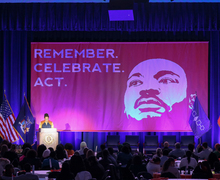Claudine Gay’s resignation is a warning to every campus
Nora Benko | Illustration Editor
University staff are being targeted for their personal political beliefs, which threatens the individuals as well as the integrity of higher education, our columnist writes.
Get the latest Syracuse news delivered right to your inbox.
Subscribe to our newsletter here.
On Jan. 2, Claudine Gay resigned from her position as president of Harvard University. Appointed less than six months prior, the first Black president of Harvard was embroiled in public scrutiny and online outrage after testifying in December about institutional responses to antisemitism on college campuses. When asked by United States Representative Elise Stefanik, R-N.Y., whether or not a hypothetical call for the genocide of Jews would be a violation of Harvard’s code of conduct, Gay responded with, “it can be, depending on the context,” along with a clarification that antisemitic rhetoric is “actionable conduct.”
The testimony drew national backlash among lawmakers and some university donors, with several politicians requesting that Gay, along with presidents of the University of Pennsylvania and the Massachusetts Institute of Technology, resign. Several donors also threatened to, or did, pause their donations after Gay’s remarks.
Meanwhile, Bill Ackman, a hedge fund manager and Harvard donor, initiated a tedious campaign against Gay, claiming that she was hired as part of Diversity, Equity and Inclusion initiatives. Ackman also stated that her actions were destroying Harvard’s reputation. Despite the public pressure campaign, Harvard initially stood behind Gay.
But this all changed after conservative news outlet The Washington Free Beacon published documents claiming that Gay improperly attributed sources in her Ph.D. dissertation and several other articles on her resume. Christopher Rufo, a right-wing activist known for his animosity toward critical race theory and LGBTQ issues, also called for Gay’s resignation, both on the merits of failing to address antisemitism and for the instances of plagiarism.
Gay eventually announced her resignation on Jan. 2, and later penned an op-ed in the New York Times, saying she received countless threats against her safety. She warned that a coordinated attempt against not just her, but the entire structural integrity of higher education, is at play. In the column, Gay asserts that university administration, students and professors alike are facing an increase in public pressure campaigns against their political opinions.
The incident at Harvard is a symptom of the broader culture wars playing out across the nation, now increasingly manifesting in academic settings.Allen Huang, Columnist
Gay’s resignation marks a critical juncture in the intersection of politics, media and education that impacts all university campuses, far from just Harvard itself. The fallout from this event underscores the vulnerability of academic institutions to external political pressures and the escalating culture wars.
Despite what some would claim, the campaign against Gay is primarily driven by political motivations over her progressive stance on social issues instead of any substantive concern over academic dishonesty. For example, after Ackman’s wife, an academic herself, was accused of plagiarism, Ackman did not reflect on whether he was justified in attacking others, but rather publicly threatened to launch lawsuits against the outlet that broke the story. All the while, Rufo celebrated the victory and publicly bragged.
Talking with Politico, he said that, “for the time being, given the structure of our institutions, this is a universal strategy that can be applied by the right to most issues. I think that we’ve demonstrated that it can be successful.”
Pressure from outside the campus that targets students, professors and administrators for their political opinions is becoming more and more pronounced across the country and poses a clear threat to personal safety and psychological well-being. For everyone on campus, such incidents can exacerbate the existing divisions within the community.
Sides will be taken on issues, with some supporting the targeted individual or policy and others opposing it. For minority and marginalized groups, witnessing the experience of high-profile figures like Gay might discourage them from speaking out on their campus. For students, this might affect their ability to engage in critical thinking and be exposed to a wide range of viewpoints.
There are many dangers against the health of campus climates if more universities decide to take the bait laid out by provocateurs like Rufo and Ackman. Such tactics could be reused again and again on other issues, leading to an environment where scholarly work and academic credentials are routinely questioned for political ends. This undermines the integrity of academic research and scholarship, essential components of university life. It could also discourage academics from engaging in socially-relevant research, fearing political backlash.
Gay’s resignation also raises questions about the selection and sustainability of university leadership. Leaders who advocate for progressive or controversial policies may find themselves increasingly vulnerable to political campaigns aimed at undermining their legitimacy. This could lead to a conservative shift in university governance, as institutions might prefer leaders who are less likely to attract political controversy. The long-term impact could be a homogenization of thought and a retreat from progressive policies in university governance.
The incident at Harvard is a symptom of the broader culture wars playing out across the nation, now increasingly manifesting in academic settings. Universities, traditionally spaces for diverse viewpoints and debate, may find themselves at the center of these conflicts. This could exacerbate a polarized and contentious environment that is antithetical to the open exchange of ideas that college campuses are responsible for bolstering.
Allen Huang is a second year Media Studies masters student. He can be reached at xhuang49@syr.edu.
Published on January 23, 2024 at 12:22 am






